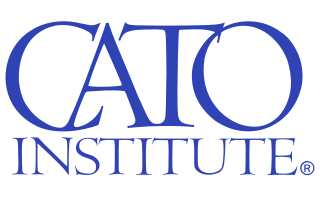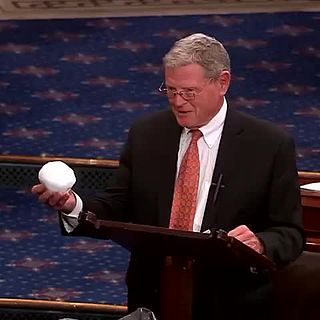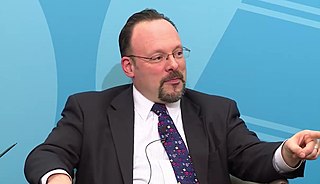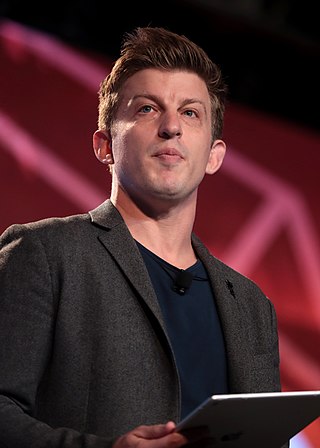Related Research Articles
Environmental skepticism is the belief that statements by environmentalists, and the environmental scientists who support them, are false or exaggerated. The term is also applied to those who are critical of environmentalism in general. It can additionally be defined as doubt about the authenticity or severity of environmental degradation. Environmental skepticism is closely linked with anti-environmentalism and climate change denial. Environmental skepticism can also be the result of cultural and lived experiences.

The Cato Institute is an American libertarian think tank headquartered in Washington, D.C. It was founded in 1977 by Ed Crane, Murray Rothbard, and Charles Koch, chairman of the board and chief executive officer of Koch Industries. Cato was established to focus on public advocacy, media exposure and societal influence.

Patrick J. Michaels was an American agricultural climatologist. Michaels was a senior fellow in environmental studies at the Cato Institute until 2019. Until 2007, he was research professor of environmental sciences at the University of Virginia, where he had worked from 1980.
Robert C. Balling, Jr. is a professor of geography at Arizona State University, and the former director of its Office of Climatology. His research interests include climatology, global climate change, and geographic information systems. Balling has declared himself one of the scientists who oppose the consensus on global warming, arguing in a 2009 book that anthropogenic global warming "is indeed real, but relatively modest", and maintaining that there is a publication bias in the scientific literature.

Ross McKitrick is a Canadian economist specializing in environmental economics and policy analysis. He is a professor of economics at the University of Guelph, and a senior fellow of the Fraser Institute.

The George C. Marshall Institute (GMI) was a nonprofit conservative think tank in the United States. It was established in 1984 with a focus on science and public policy issues and had an initial focus in defense policy. Starting in the late 1980s, the institute advocated for views in line with environmental skepticism, most notably climate change denial. The think tank received extensive financial support from the fossil fuel industry.
The Competitive Enterprise Institute (CEI) is a non-profit libertarian think tank founded by the political writer Fred L. Smith Jr. on March 9, 1984, in Washington, D.C., to advance principles of limited government, free enterprise, and individual liberty. CEI focuses on a number of regulatory policy issues, including business and finance, labor, technology and telecommunications, transportation, food and drug regulation, and energy and environment in which they have promoted climate change denial. Kent Lassman is the current President and CEO.

The Heartland Institute is an American conservative and libertarian 501(c)(3) nonprofit public policy think tank known for its rejection of both the scientific consensus on climate change and the negative health impacts of smoking.
Anti-environmentalism is a set of ideas and actions that oppose environmentalism as a whole or specific environmental policies or environmental initiatives.

Climate change denial is a form of science denial characterized by rejecting, refusing to acknowledge, disputing, or fighting the scientific consensus on climate change. Those promoting denial commonly use rhetorical tactics to give the appearance of a scientific controversy where there is none. Climate change denial includes unreasonable doubts about the extent to which climate change is caused by humans, its effects on nature and human society, and the potential of adaptation to global warming by human actions. To a lesser extent, climate change denial can also be implicit when people accept the science but fail to reconcile it with their belief or action. Several studies have analyzed these positions as forms of denialism, pseudoscience, or propaganda.

Jonathan H. Adler is an American legal commentator and law professor at the Case Western Reserve University School of Law. He has been recognized as one of the most cited professors in the field of environmental law. His research is also credited with inspiring litigation that challenged the Obama Administration's implementation of the Affordable Care Act, resulting in the Supreme Court's decision in King v. Burwell.

The Deniers is a 2008 book by Lawrence Solomon, a Canadian environmentalist and writer. Subtitled "The world-renowned scientists who stood up against global warming hysteria, political persecution, and fraud," the book draws attention to a number of scientists and others who, according to Solomon, have advanced arguments against what he calls the "alarmist" view of global warming, as presented by Al Gore, the Intergovernmental Panel on Climate Change (IPCC), the mainstream media, and others. The book is based on a series of columns Solomon wrote for Canada's National Post. It has been criticized for misquoting the scientists it featured.

An Appeal to Reason: A Cool Look at Global Warming is a 2008 book by Nigel Lawson. In it, Lawson claims that, although global warming is happening, the science is far from settled. He opposes the scientific consensus as summarized by the IPCC. He also argues that warming will bring both benefits and negative consequences, and that the impact of these changes will be relatively moderate rather than apocalyptic. The book has been rejected by climatologists, including IPCC authors Jean Palutikof and Robert Watson as unscientific.
Energy Probe is a non-governmental social, economic, and environmental policy organization based in Toronto, Canada known recently for denying man-made climate change.

Media coverage of climate change has had effects on public opinion on climate change, as it conveys the scientific consensus on climate change that the global temperature has increased in recent decades and that the trend is caused by human-induced emissions of greenhouse gases.

Joseph Lee Bast is an American right-wing political activist. He is the former president and CEO of The Heartland Institute, an American nonprofit conservative and libertarian public policy think tank based in Arlington Heights, Illinois. He retired as president and CEO in July 2017 when former Congressman Tim Huelskamp took over those roles in the organization. Huelskamp was followed as president at Heartland by Frank Lasee in 2019, and then James Taylor in 2020.

Alexander Joseph Epstein is an American author who advocates for the expansion of fossil fuels and who rejects the scientific consensus on climate change. Epstein is the author of The Moral Case for Fossil Fuels (2014) and Fossil Future (2022), in which he argues for the expanded use of fossil fuels like coal, oil, and natural gas.
Robert J. Brulle is an American environmental sociologist and professor of sociology and environmental science at Drexel University. He is also an associate professor of public health at the Drexel University School of Public Health. He advocates aggressive political action to address global warming.
The Niskanen Center is an American think tank based in Washington, D.C. that advocates environmentalism, immigration reform, civil liberties, and strengthening social insurance around market-oriented principles. Named after William A. Niskanen, an economic adviser to Ronald Reagan, it states that its "main audience is Washington insiders", and characterizes itself as moderate. The organization has been credited with fostering bipartisan dialogue and promoting pragmatic solutions to contemporary political challenges on issues such as family benefits, climate change, and criminal justice reform.
The CO2 Coalition is a 501(c)(3) nonprofit advocacy organization in the United States founded in 2015. Its climate change denialist claims conflict with the scientific consensus on climate change.
References
- 1 2 "THINK TANKS: Brothers duke it out from opposite sides of climate fight". www.eenews.net. Retrieved 2021-05-17.
- 1 2 Lerner, Sharon (28 April 2017). "How a Professional Climate Change Denier Discovered the Lies and Decided to Fight for Science". The Intercept . Archived from the original on 23 July 2020.
- 1 2 Roberts, David (2015-05-12). "The arguments that convinced a libertarian to support aggressive action on climate". Vox. Retrieved 2020-02-17.
- ↑ Johnston, Ian (2 May 2017). "How climate change deniers' lies made a leading sceptic change sides". The Independent . Archived from the original on 11 May 2019.
- ↑ "Think tank president quits after domestic violence complaint". Politico. 2021-09-29.
- ↑ "Interview with Jerry Taylor". 2005-04-04. Archived from the original on 2006-05-03. Retrieved 2022-07-12.
